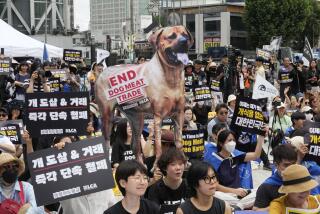Judge Clears Cambodians Who Killed Dog for Food
- Share via
A Long Beach judge Tuesday dismissed all charges against two Cambodian refugees accused of misdemeanor cruelty to animals for killing a German shepherd puppy for food.
“Under (the) facts, I don’t believe it can be said that these defendants inflicted unreasonable pain on the animal,” Long Beach Municipal Judge Bradford L. Andrews said in responding to a defense motion that the case be dismissed for lack of evidence. “To hold otherwise would subject every slaughterhouse employee or farmer to prosecution.”
Earlier in the case, Andrews had ruled that killing an animal for food is not illegal unless it is done in a cruel way.
The two refugees--Sokheng Chea, 32, and Seng Ou, 33--had admitted hitting the 4-month-old puppy over the head with a blunt instrument, slashing its throat and skinning it on the floor of Ou’s Long Beach apartment. But in doing so, they said, they had been following their cultural customs with no idea that the action would be considered offensive to Americans.
Considered Delicacies
While local Cambodian leaders say the practice of eating dogs was rare in their country before the 1970s, other Asian leaders report that the animals are considered delicacies in such countries as Vietnam, Korea and the Philippines.
The Long Beach case had been closely watched by animal rights activists who said it was the first time to their knowledge that Southeast Asian refugees had been prosecuted for attempting to eat a dog.
“I’m very disappointed in the outcome,” said Wendy Aragon, president of the Pet Assistance Foundation, based in Van Nuys. “I think that what these defendants did offends the sensibilities of the community. There is a need for legislation to outlaw the slaughter of dogs and cats; they are companion animals, not food animals.”
Because of the ruling by the judge early in the trial that killing a dog for food is not in itself a violation of the law, prosecutor Sarah Lazarus had to prove, in the judge’s words, that the dog was “maimed, wounded, tortured, mutilated or tormented” in a manner beyond that required to prepare it as food. To prove her case, the prosecutor produced a neighbor who had witnessed part of the incident and two veterinarians, including one who had examined the carcass.
Their testimony, in Judge Andrews’ opinion, did not establish unequivocally that the animal was treated inhumanely and therefore did not constitute a case strong enough to submit to the jury. In dismissing the matter, however, he warned that the ruling should not be taken as a license to kill pets.
“I am sympathetic to the feelings of those who champion the cause of animal rights,” Andrews said, “but the remedy lies in convincing the Legislature to enact laws that would make the actions of these defendants unlawful.”
Both defendants expressed relief at the outcome.
“I am happy,” Ou said through an interpreter, “but I can assure you that there will be no second time.”
More to Read
Sign up for Essential California
The most important California stories and recommendations in your inbox every morning.
You may occasionally receive promotional content from the Los Angeles Times.













